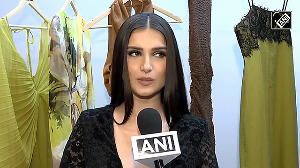'I wonder if they will keep it up after the elections.'
'I fear they'll start questioning eligibility -- income, age, bank accounts -- and eventually stop the scheme altogether.'

Saraswati Jadhav stands near the fence of her modest home, a growing impatience clouding her tired expression as she waits for news of her husband.
A few days ago, he suffered a cardiac arrest, and since then, she has found herself perched on the edge of uncertainty, balancing between hope and fear.
A resident of Mohadi, a village deep in Nashik's agricultural belt -- home to India's grape capital -- Jadhav works as a daily wage labourer.
She earns a meagre Rs 250 to Rs 300 a day, a sum that just about covers food and the basics.
The economic rhythm she relies on can be easily disrupted by any health crisis, leaving her vulnerable.
But there is a glimmer of financial relief in the form of a government initiative that's touched the lives of women like Jadhav.
Since July, she has received Rs 1,500 each month under the state's Mukhyamantri Majhi Lazdki Bahin Yojana (MMLBY), part of a larger push to support low-income families ahead of Maharashtra's November 20 assembly elections.

The funds, though modest, have helped cushion the blow of an already fragile financial situation.
"I've received Rs 7,500, and my daughter another Rs 7,500 from the scheme. Together, that's eased some of the burden. Without it, we would've had to skip meals to manage the hospital costs," says a teary-eyed Jadhav.
The scheme, launched by Chief Minister Eknath Shinde's Mahayuti coalition (primarily comprising the Bharatiya Janata Party, the Shiv Sena and the Nationalist Congress Party), offers Rs 1,500 per month to women between 21 and 65 years from families with annual incomes under Rs 2.5 lakh.
As the elections neared, Shinde promised an increase, pledging Rs 2,100 a month for eligible women if the coalition retains power.
In response, the Opposition Maha Vikas Aghadi (MVA) -- the grouping of the Congress, the Shiv Sena (UBT), and the Nationalist Congress Party-Sharadchandra Pawar -- rolled out its own proposal: The Mahalakshmi Yojana, promising Rs 3,000 per month, along with free bus rides for women.
With 46.7 million women voters in a state of 95 million eligible voters, both sides were fiercely competing for their support, attempting to shift the balance with cash incentives.
Yet, despite the promises, many women remain sceptical about how these schemes will affect their financial realities.
Inflation, particularly the soaring costs of food, fuel, and everyday essentials, continues to erode their purchasing power.
"The government should not think that we do not understand their politics," says one of Jadhav's neighbours.
"Even with Rs 1,500 a month, it's hard to plan for anything beyond basic survival. How can I save for my children's education when prices keep rising? It's like they give us the money, let us touch it, then take it back."
Her frustration is not unfounded.
India's retail inflation hit a 14-month high of 6.21 per cent in October, driven by food prices, with rural inflation rising to 6.68 per cent -- a painful blow to daily wage earners.
Food inflation alone surged to 10.87 per cent, up from 9.24 per cent the month before.
Despite these challenges, Jadhav feels a sense of relief, even if fleeting.
"At least this money helps us keep up with the rising prices. It's not much, but it's better than nothing. That brings some clarity to whom to vote for."
When asked about the MVA's larger promise of Rs 3,000 a month, Jadhav is dismissive.
"Are they in power? Have they given us anything? We're getting this money now, and I believe it'll continue for the next five years," she replies as she assures her neighbour too.
Elsewhere in the state, in towns like Malshiras in Solapur, similar sentiments are being voiced.
Women's expectations are tempered by the uncertainty of future payments.
"The MVA's promise seems too good to be true. Rs 3,000 a month? It's too much," says a local woman.
"Rs 2,100 is more realistic. But who knows if any of them will keep their word after the elections?"
For many in rural Maharashtra, issues such as housing, toilets, and access to education for their children remain far more pressing.
In villages like Rohilagad, 230 kilometres from Nashik, Ankush Patil -- toiling in cotton fields -- voices his concerns about the longevity of schemes like the Laadki Bahin Yojana.
"The government's speed in rolling out these payments is rare, but I wonder if they will keep it up after the elections. I fear they'll start questioning eligibility -- income, age, bank accounts -- and eventually stop the scheme altogether," he says, his scepticism deepened by the memory of discontinuation of past schemes targeting a section of society.
Patil also reflects on the patriarchal nature of voting patterns in Maharashtra.
"We've seen political upheavals in the past five years, and COVID-19 and drought have left us in tough conditions. Why wasn't help delivered so swiftly then? Nonetheless, we sensitise women in our house whom to vote for, and the Laadki Bahin Yojana shall have little effect on that pattern," he adds.
In urban centres like Pune, government employees, excluded from the scheme, voiced frustration over their lack of access to these benefits.
"We also need money but they have exempted us? We don't earn a lot. They should have included us," says a government employee in Hadapsar.
Back in Nashik, Jadhav's home remains as humble as her life.
She taps her fingers on the soot-streaked metal roof, where the marks of smoke from the wooden stove are clear.
"We can see an LPG cylinder here but we still use a chool (wooden stove). We can't afford an LPG cylinder. We've never benefited from the Ujjwala Yojana, and Rs 830 for a cylinder is far beyond our reach. That's why our house looks black as coal," she says smiling grimly.
Feature Presentation: Aslam Hunani/Rediff.com












 © 2025
© 2025